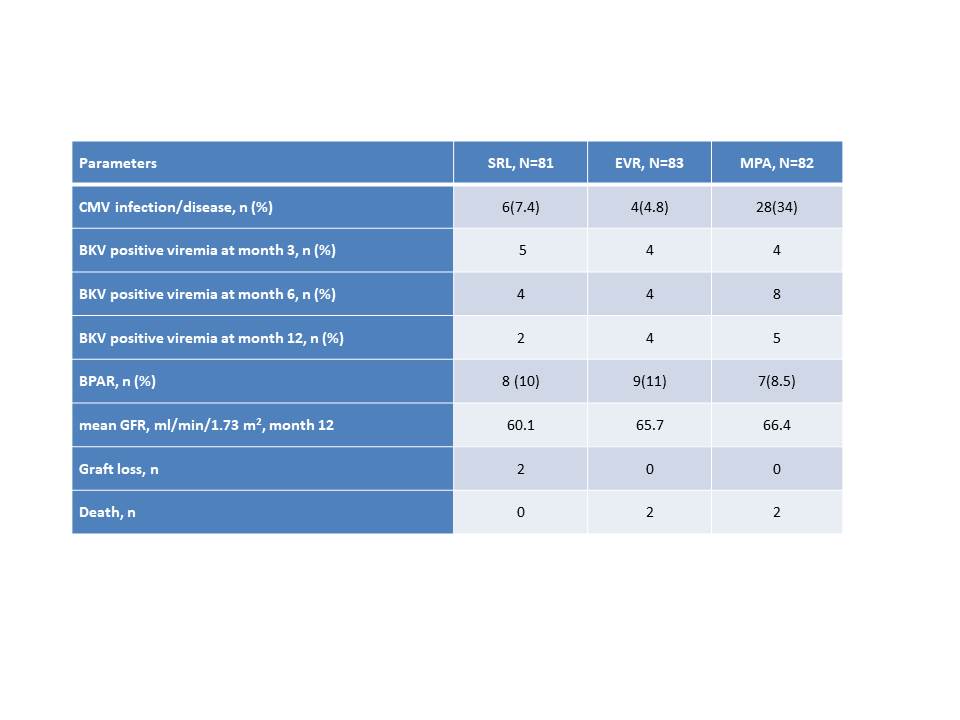Sirolimus (SRL) versus Everolimus (EVR) versus Mycophenolate (MPA) in Kidney Transplant Recipients Receiving Anti-Thymocyte Globulin Induction (r-ATG), Tacrolimus (TAC), and Prednisone
Nephrology Division, Hospital Do Rim, Sao Paulo, Brazil
Meeting: 2020 American Transplant Congress
Abstract number: D-006
Keywords: Kidney transplantation
Session Information
Session Name: Poster Session D: Kidney Immunosuppression: Induction Therapy
Session Type: Poster Session
Date: Saturday, May 30, 2020
Session Time: 3:15pm-4:00pm
 Presentation Time: 3:30pm-4:00pm
Presentation Time: 3:30pm-4:00pm
Location: Virtual
*Purpose: The aim of this study is to compare the efficacy and safety of SRL versus EVR versus MPA in kidney transplant recipients
*Methods: This is an ongoing single center, prospective and randomized trial in kidney transplant recipients receiving a single 3 mg/kg dose of r-ATG induction therapy, tacrolimus and faster prednisone taper (Clinicaltrials.govNCT03468478). Randomized patients receive SRL (3 mg QD adjusted to maintain concentrations between 4 to 8 ng/mL), EVR (3 mg BID adjusted to maintain concentrations between 4 to 8ng/mL), or MPA (720 mg BID). All patients received preemptive treatment for CMV infection
*Results: This preliminary analysis includes data from the first 246 kidney transplants recipients receiving SRL (n=81), EVR (n=83), or MPA (n=82). Key efficacy and safety outcomes are shown in Table. The incidence of CMV infection/disease is higher in the MPA group but there is no difference in the incidence of biopsy proven acute rejection (BPAR) and in mean estimated glomerular filtration rate (eGFR) at month 12.
*Conclusions: These preliminary data suggest that comparable mTOR inhibitor exposures show similar efficacy compared to MPA and lower incidence of viral infection.
To cite this abstract in AMA style:
Jr HTedesco, Felipe CT, Viana L, Cristelli M, Tenório N, Lima V, Azevedo V, Ficher K, Rezende J, Demarchi R, Nakamura M, Dreige Y, Ormenesse G, Taddedo J, Takara L, Santos C, Damasceno L, Pestana J. Sirolimus (SRL) versus Everolimus (EVR) versus Mycophenolate (MPA) in Kidney Transplant Recipients Receiving Anti-Thymocyte Globulin Induction (r-ATG), Tacrolimus (TAC), and Prednisone [abstract]. Am J Transplant. 2020; 20 (suppl 3). https://atcmeetingabstracts.com/abstract/sirolimus-srl-versus-everolimus-evr-versus-mycophenolate-mpa-in-kidney-transplant-recipients-receiving-anti-thymocyte-globulin-induction-r-atg-tacrolimus-tac-and-prednisone-2/. Accessed July 2, 2025.« Back to 2020 American Transplant Congress

